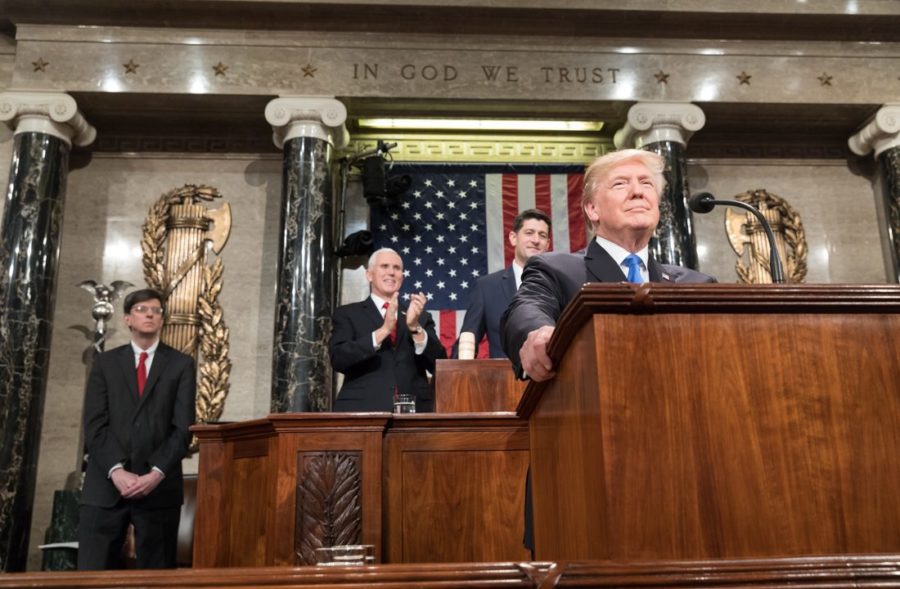Trump faces potentially close re-election race as US enters presidential election year
President Donald Trump delivering the 2018 State of the Union Address from the U.S. Capitol Building in Washington, D.C.
December 31, 2019
The United States enters a presidential election year with the changing of calendars to 2020.
President Donald Trump began his re-election campaign early, filing his campaign with the Federal Election Commission (FEC) on the day of his inauguration in 2017.
Since his campaign began, Trump has hosted rallies across the United States, raised more than $165 million in campaign funds according to FEC documents and launched his 2020 re-election campaign slogans: “Keep America Great” and “Promises Made, Promises Kept.”
On June 18, 2019, Trump launched his official reelection campaign and confirmed Mike Pence would be his running mate in 2020.
Mack Shelley, Iowa State professor and chair of the political science department, said Trump has as good a chance to win as any of the Democratic candidates do at this time.
Nationally, Trump’s approval rating is currently 44.5 percent according to the RealClearPolitics polling average.
Trump is polling behind Democratic Party primary national frontrunners former Vice President Joe Biden and Sen. Bernie Sanders by 4.5 percent and 2.6 percent respectively, according to RealClearPolitics polling averages.
In 2016, Trump lost to Hillary Clinton in the national popular vote by close to 3 million votes, or 2.1 percent, but won the electoral college 304 to 227.
“Trump’s possible success in the 2020 presidential election is going to depend most importantly on whether he can win just about all the same states he won in 2016,” Shelley said.
Trump is polling close to the Democratic candidates in smaller states, which may become essential to both sides if the electoral college battlegrounds remain similar to how they were in 2016, Shelley said.
“For the Democratic candidate to win in 2020, enough states that Trump won in 2016, particularly Pennsylvania, Wisconsin, and Michigan, would need to be flipped,” Shelley said.
Voter turnout could heavily affect Trump’s re-election chances, especially with younger voters coming out to vote, Shelley said.
In the 2018 midterms, 67 percent of voters ages 18 to 29 voted for Democratic congressional candidates while 32 percent voted for Republicans, according to CNN exit polls.
Whoever the Democratic nominee is could potentially affect Trump’s campaign in one way or another, Shelley said.
Economics may also play in role in Trump’s fate.
If a major economic downturn is ongoing a few months before the November 2020 election, it could produce serious fractures in Trump’s base, Shelley said.
Since Trump was elected the national unemployment rate has gone down, stock market indices have increased and there has been positive economic growth in each quarter.
The only aspect that has negatively affected the economy while Trump has been in office is the ongoing trade war with China.
While most economic indicators are positive, the president’s actions in office led to his impeachment by the House of Representatives in late 2019.
“Trump’s impeachment will probably both help and hurt his prospects for reelection in the 2020 presidential contest,” Shelley said.
Trump can use the impeachment to his advantage to “fire up” his base, while Democrats can use impeachment to persuade voters to not vote for Trump, Shelley said.
If the Senate decides to move forward with Trump’s removal from office that could potentially harm, or even end his reelection campaign.
“Removal by the Senate — following a vote to convict him of one or more impeachable offenses — would not in and of itself legally bar him from running for re-election,” said Raleigh Levine, an election law professor at the Mitchell Hamline School of Law in an email to the Daily. “The Senate could hold a separate vote to disqualify him from holding office in the future.”







